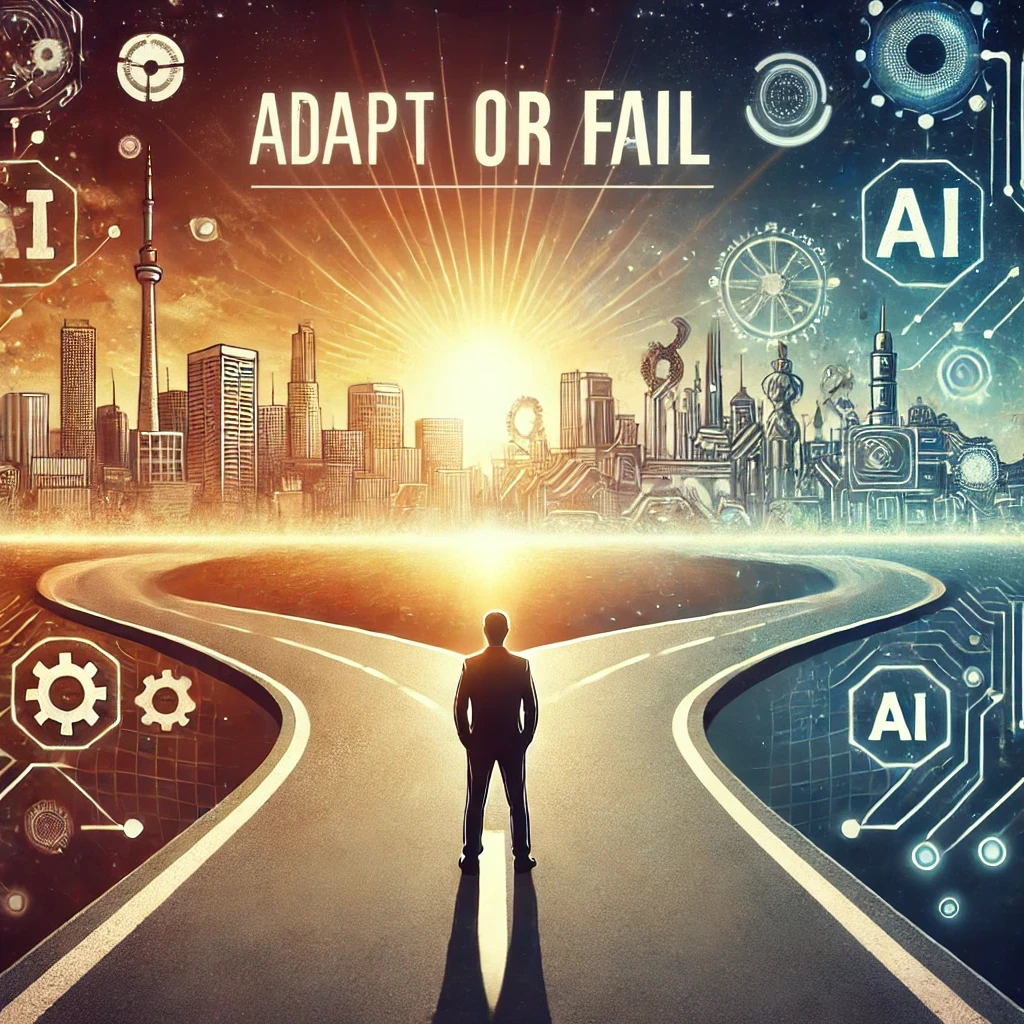Adapt or Fail: Why Entrepreneurs Must Evolve with AI
Welcome to Part 2 of our series on the impact of AI on entrepreneurship. In this article, we explore why adaptation is crucial in an AI-driven world. As AI continues to revolutionize industries, entrepreneurs must evolve to stay competitive. Learn why embracing AI isn't optional but necessary for long-term success and discover the key areas where AI can transform your business.
AI is no longer a futuristic concept—it is a force that is reshaping the business world across every sector. The dominance of artificial intelligence in business is inevitable, and for entrepreneurs, the message is clear: adapt or be left behind. In today’s hyper-competitive market, standing still is no longer an option. AI is not only changing how businesses operate but also setting a new standard for innovation and efficiency. For modern entrepreneurs, adopting AI is no longer a choice—it’s a matter of survival.
Section 1: The Competitive Edge of AI Adoption
The entrepreneurs who are embracing AI early are reaping enormous rewards, gaining a distinct competitive edge in efficiency, cost reduction, and innovation. AI enables businesses to process vast amounts of data quickly, streamline operations, and make more informed decisions in real-time. This ability to respond faster and smarter is creating clear winners in today’s marketplace.
Industries like retail, healthcare, and manufacturing have already been completely transformed by AI. In retail, companies like Amazon have leveraged AI to optimize inventory management, personalize customer recommendations, and streamline the entire shopping experience. Healthcare is benefiting from AI-driven diagnostics, where machine learning algorithms help doctors detect diseases faster and with greater accuracy. In manufacturing, AI-powered robotics and predictive maintenance systems are reducing downtime and increasing production efficiency.
Entrepreneurs who harness AI in these ways are staying ahead of the curve, delivering better products and services while significantly lowering their operational costs. Those who do not are quickly losing ground to their AI-empowered competitors.
Section 2: The Risks of Stagnation
Failing to adopt AI is not just a missed opportunity—it’s a direct path to obsolescence. As AI becomes more integrated into every business function, the gap between those who adapt and those who resist is widening. History has shown that companies that fail to embrace new technologies are eventually pushed out of the market.
Consider once-thriving giants like Blockbuster and Kodak. Both companies held dominant market positions, but their refusal to adapt to new technologies—streaming for Blockbuster and digital photography for Kodak—led to their rapid decline and ultimate failure. In contrast, Netflix and Apple, which embraced digital innovation early on, now dominate their respective industries.
Entrepreneurs who fail to evolve with AI face similar risks. In a marketplace where AI is driving innovation, companies that resist will find themselves unable to compete, losing customers to more agile and technologically advanced competitors.
Section 3: Key Areas Where Entrepreneurs Must Adapt
To thrive in the age of AI, entrepreneurs must identify and integrate AI into key areas of their business. Here are the most crucial domains where AI can enhance operations:
- Customer Engagement: AI-driven chatbots and virtual assistants can provide 24/7 customer support, handling common inquiries and personalizing interactions based on customer data. By doing so, businesses can offer seamless customer experiences while reducing operational costs.
- Product Personalization: AI can analyze customer preferences and behaviors to deliver hyper-personalized recommendations and product offerings. Retailers like Shopify and Netflix use AI to anticipate customer needs, increasing customer satisfaction and loyalty.
- Supply Chain Management: AI optimizes the entire supply chain, from inventory management to demand forecasting. AI-powered systems can predict stock shortages, streamline shipping routes, and even automate the restocking process, ensuring that businesses operate smoothly and efficiently.
- Operational Efficiency: AI automates repetitive and time-consuming tasks, allowing employees to focus on more strategic work. In industries like manufacturing and logistics, AI-powered robotics are increasing efficiency by performing tasks with precision and speed that human labor simply can’t match.
Adapting to AI means leveraging these technologies to improve efficiency, enhance customer experience, and streamline business processes. Entrepreneurs who make AI a central part of their strategy will be better equipped to face future challenges and capitalize on emerging opportunities.
Conclusion
AI is no longer an option but a necessity for entrepreneurs who want to remain competitive in today’s rapidly evolving business landscape. The ability to adapt, innovate, and evolve with AI is what will distinguish successful entrepreneurs from those who get left behind. The message is clear: adaptability is the hallmark of modern entrepreneurship, and those who fail to embrace AI risk falling into irrelevance.
The choice is simple: evolve with AI or face the consequences of stagnation. To survive and thrive in this new era, entrepreneurs must act now—embracing AI to drive innovation, efficiency, and growth in their businesses.
This article is part of a four-part series on AI and the future of entrepreneurship. Continue your journey and explore how AI can revolutionize your approach to business:
- Part 1: The AI Revolution: Redefining the Entrepreneurial Landscape
- Part 3: Mastering AI: Tools and Strategies for the Future-Ready Entrepreneur
- Part 4: The Future is Now: How AI Will Shape Tomorrow's Leaders and Innovators




Comments
Post a Comment